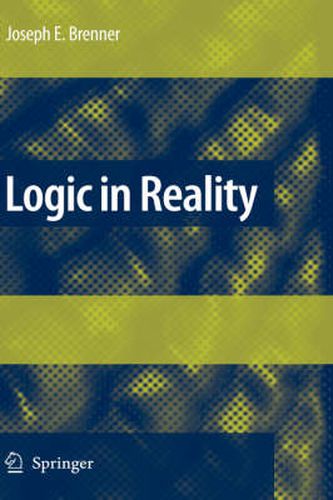Readings Newsletter
Become a Readings Member to make your shopping experience even easier.
Sign in or sign up for free!
You’re not far away from qualifying for FREE standard shipping within Australia
You’ve qualified for FREE standard shipping within Australia
The cart is loading…






This title is printed to order. This book may have been self-published. If so, we cannot guarantee the quality of the content. In the main most books will have gone through the editing process however some may not. We therefore suggest that you be aware of this before ordering this book. If in doubt check either the author or publisher’s details as we are unable to accept any returns unless they are faulty. Please contact us if you have any questions.
This book is both dif?cult and rewarding, affording a new perspective on logic and reality, basically seen in terms of change and stability, being and becoming. Most importantly it exemplifies a mode of doing philosophy of science that seems a welcome departure from the traditional focus on purely analytic arguments. The author approaches ontology, metaphysics, and logic as having offered a number of ways of constructing the description of reality, and aims at deepening their relationships in a new way. Going beyond the mere abstract and formal aspects of logical analysis, he offers a new architecture of logic that sees it as applied not only to the reasoning processes belonging to the first disciplinary group - ontology - but also directly concerned with en- ties, events, and phenomena studied by the second one - metaphysics. It is the task of the book to elaborate such a constructive logic, both by offering a lo- cal view of the structure of the reality in general and by proffering a wealth of models able to encompass its implications for science. In turning from the merely formal to the constructive account of logic Brenner overcomes the limitation of logic to linguistic concepts so that it can be not only a logic of reality but also in that reality which is constitutively characterized by a number of fundamental dualities (observer and observed, self and not-self, internal and external, etc.
$9.00 standard shipping within Australia
FREE standard shipping within Australia for orders over $100.00
Express & International shipping calculated at checkout
This title is printed to order. This book may have been self-published. If so, we cannot guarantee the quality of the content. In the main most books will have gone through the editing process however some may not. We therefore suggest that you be aware of this before ordering this book. If in doubt check either the author or publisher’s details as we are unable to accept any returns unless they are faulty. Please contact us if you have any questions.
This book is both dif?cult and rewarding, affording a new perspective on logic and reality, basically seen in terms of change and stability, being and becoming. Most importantly it exemplifies a mode of doing philosophy of science that seems a welcome departure from the traditional focus on purely analytic arguments. The author approaches ontology, metaphysics, and logic as having offered a number of ways of constructing the description of reality, and aims at deepening their relationships in a new way. Going beyond the mere abstract and formal aspects of logical analysis, he offers a new architecture of logic that sees it as applied not only to the reasoning processes belonging to the first disciplinary group - ontology - but also directly concerned with en- ties, events, and phenomena studied by the second one - metaphysics. It is the task of the book to elaborate such a constructive logic, both by offering a lo- cal view of the structure of the reality in general and by proffering a wealth of models able to encompass its implications for science. In turning from the merely formal to the constructive account of logic Brenner overcomes the limitation of logic to linguistic concepts so that it can be not only a logic of reality but also in that reality which is constitutively characterized by a number of fundamental dualities (observer and observed, self and not-self, internal and external, etc.